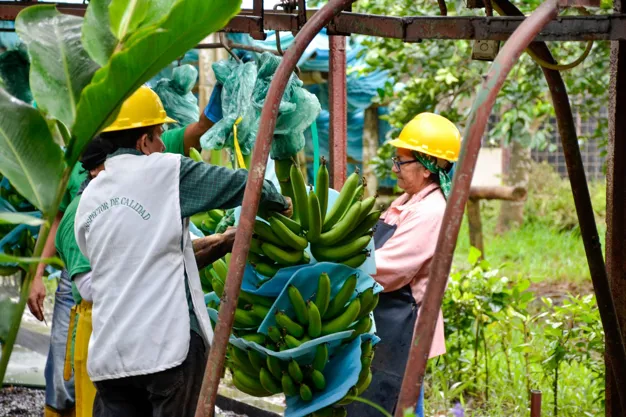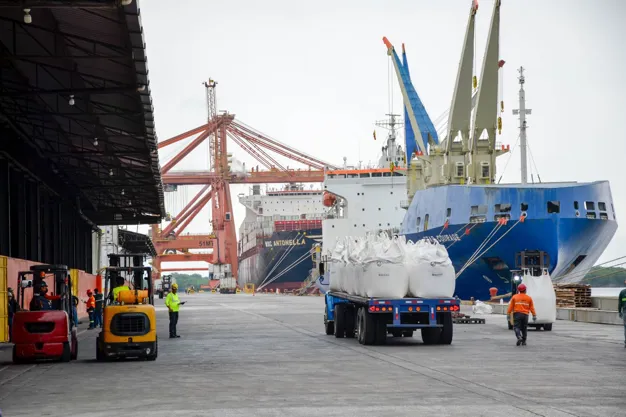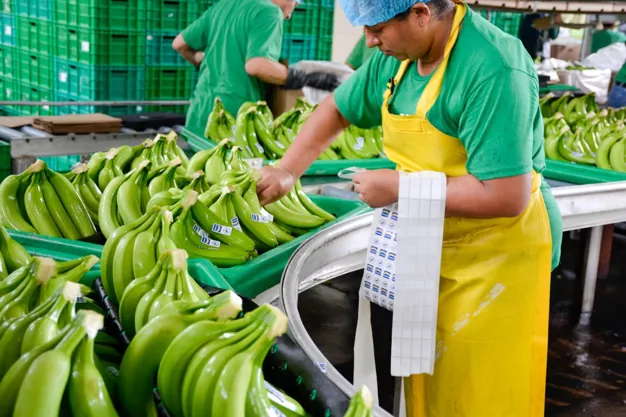As Bananas remain a staple in any retail produce isle and most fruit baskets around the world, the world leaders in the export of this fruit, namely Ecuador, are placing significant effort into providing for the safety of their people and products. According to Jose Antonio Hidalgo, executive director of the Association of Ecuadorian Banana Exporters (AEBE), although they have higher exports this year (2023), it has still not reached the pre-Covid levels.

“We have a higher export volume that also favours other sectors of the banana value chain. Between January and October of this year (2023), there has been an increase of 6.36% in the volume exported compared to the same period in 2022. But we are still below the volume shipped three years ago, when the pandemic exceeded 380 million boxes exported,” states Hidalgo.
Due to Ecuador’s precarious safety situation, as an industry organisation, AEBE have invested in a host of safety initiatives to ensure the overall safety, not only of banana sector workers, but the country’s reputation too. “Safety is important for the sector because it impacts the peace of mind of workers, producers, exporters, and the reputation of the industry, which is affected by banana shipments that arrive contaminated, especially to the United States of America and the European Union, markets that represent 40% of weekly exports. This has an impact on the cost of production and export operation and competitiveness. The sector invests $200 per container, a value that is not passed on to the buyer. This situation makes us victims. For this reason, we will continue to coordinate efforts with public security agencies to put an end to this situation,” explains Antonio Hidalgo.

The Libertador Simon Bolivar Port Container and Multipurpose Terminal, located in the Port of Guayaquil, is operated by Contecon Guayaquil S.A.
Panama Canal delays worrying
Bananas as a perishable commodity are sensitive to the current delays at the Panama Canal says Hidalgo, that impact is on their competitiveness in terms of price, transit days, shipping scheme and fruit quality. The first quarter of 2024 will be marked basically by the logistical aspect generated by the weather. About 82% of our bananas have the Panama Canal as an obligatory passage. Ecuador is the ninth largest user of this waterway, with a share of 4.9% over the last year. The drought in the Canal area and the consequent announcement by the Authority of an increase in the restriction of traffic has generated a first consequence. Three of the four main shipping companies that ship bananas in Ecuador: MSC, CMA CGM and Hapag Lloyd, have announced that they will impose a surcharge per container passing through the Canal. MSC applied it from 15 December, CMA CGM and Hapag Lloyd will do so from 1 January 2024. Other shipping companies, such as Sea Trade, are studying the possibility of using the Strait of Magellan as an alternative route, arguing that the cost of passing through it is almost similar to the cost of passing through the Canal.”

Highlights for the AEBE include participation in the negotiation of free trade agreements with China and South Korea. Social sustainability is another key aspects. “In the Summary Report on the Wage Analysis of Ecuadorian Banana Plantation Workers Linked to the German Market, coordinated by the German Supermarkets Working Group made up of Aldi Süd, Aldi Nörd, Dm, Kaufland, Rewe, it found that 99.36% of the workers involved in the analysis received a living wage. This demonstrated the sector's compliance with the payment of the living wage, which was established by law in 2010,” concludes Antonio Hidalgo.
For more information:
Jose Antonio Hidalgo
AEBE
Tel: +593 96 402 9141
Email: communications@aebe.com.ec
www.aebe.com.ec
